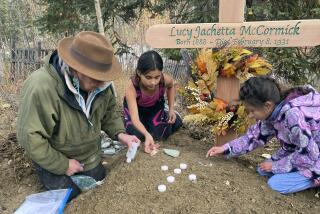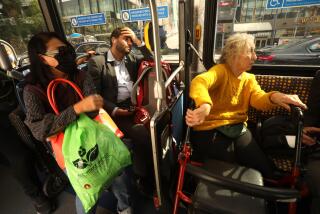ON THE ROAD : A Call to Remember the Forgotten Sick
- Share via
NEWBURY PARK — Down the hall, past the shadowy room where the old woman’s voice cries out for help, past the bright nurses’ station, past the room with the stainless steel immersion tanks, Mildred waits. In bed. On her side, head propped on pillows.
“Honey,” she says to her visitor, “have you been to the thrift shop today? My! You ought to see what they’ve got.”
She scoots up, her face gone from white to blush, her pale blue eyes suddenly filled with light, and she gestures across the room.
“I’m telling you, it’s something down there,” she insists, a Southern lilt dragging out the words like molasses. “Take a gooooood look.”
In the visitor’s chair is the prize: a used, poppy-yellow quilted housecoat from the nursing home store--a Loungee, the label says, with fuzzy collar--with the price tag still dangling: $5.
“Give me your hand,” she says, reaching out and smiling, and then squeezes tight with both of her own strong hands. “Now, who are you?”
*
The Mary Health of the Sick Convalescent and Nursing Hospital has been here for 29 years. It’s a different kind of nursing home in that all its clients are women--not by edict but by habit.
The 19th Century Spanish order of nuns, Sister Servants of Mary, which has 121 outposts worldwide as well as a convent in Oxnard, runs the place. As nuns go, they are a severe group in their dedication and mission. They exist solely to care for the forgotten sick.
In past generations, especially through Europe and Central America, nuns from Sister Servants of Mary would avoid clinics and hospitals, and travel to private homes to minister to the sick through the night. The nuns would return to their convent at daybreak and sleep during the day, only to rise again to permeate the night to dispense care and prayer.
We don’t keep our parents so much anymore. Today, the needful and dependent are often the elderly with no place to go. The sisters saw their client base shift and in need of centralized care.
Hence the immaculate facility here. The nonprofit nursing home is run with such efficiency and discipline--white habits flow through gleaming hallways, followed by a humble paid staff of 48--that the nondenominational waiting list to get in is five years.
Still, just as the sisters knew that burdened families could use a lift, so, too, do the sisters receive a helping hand from volunteers. And one of the most popular of the volunteer efforts involves young boys who visit, deliver the day’s newspaper and chat with residents about bargains in the thrift store or whatever else pops up.
*
Brothers Russ and Chris Trumpy, 15 and 12, respectively, are Thousand Oaks Boy Scouts. They started making visits here in an effort to meet the community service requirement for the Ad Altare Dei (At God’s Altar) Medal. They’ve gotten to know some of the residents. But that doesn’t exactly prepare them for every eventuality.
In the large, echoey recreation room, six women in wheelchairs sit before a TV that blares cartoons.
“Help me, help me,” says one, a regular on Russ’ visit list. Russ takes her hand. “Help me! Help me!”
Russ suggests that she might like another channel. But a switch to “Oprah” won’t do. She recommences her cry: “Help me!”
Russ suggests a ride through the hallway. The woman, a former schoolteacher in the grip of Alzheimer’s disease, smiles as he whisks her away.
Russ’ briefest visit is to the elegant woman who sits alone in her room and plays solitaire. She is legally blind, neatly coiffed and so poised as to appear tournament-ready. She breaks her concentration only to note, “My daughter gave me this book, ‘1,000 Ways to Play Solitaire.’ Can you imagine?”
Mildred with the yellow housecoat might. As Russ and a visitor stopped by her room, it became plain how imagination and memory fills her time, creates the light in her eyes.
Mildred, a horsewoman from Kentucky, will soon turn 98. For her 97th birthday, a volunteer with stables in Westlake had her over and brought a horse up close so that Mildred could feed it carrots.
This year, Mildred’s party still is taking shape. But meanwhile, she’ll tell anybody who stops by not to pass through life without stopping in bluegrass country.
“Otherwise,” she says, “you’re truly missin’ one good time.”
More to Read
Sign up for The Wild
We’ll help you find the best places to hike, bike and run, as well as the perfect silent spots for meditation and yoga.
You may occasionally receive promotional content from the Los Angeles Times.






